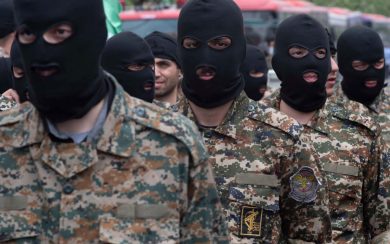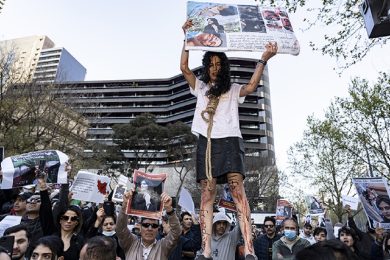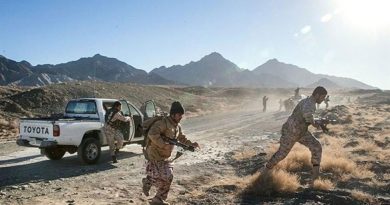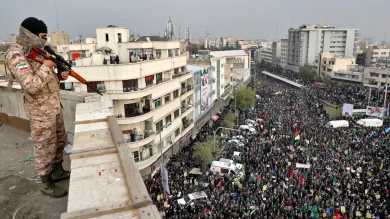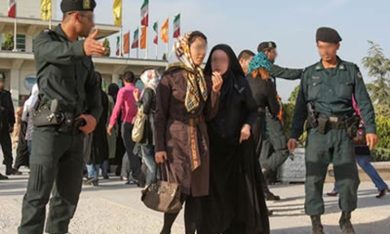The Islamic Revolutionary Guard Corps (IRGC) has become a powerful economic force in Iran, operating as both a military organization and an economic conglomerate. Beyond its role in safeguarding the regime, the IRGC has built an extensive economic empire, controlling key industries such as oil, construction, telecommunications, and transportation. This vast financial network not only funds the IRGC’s internal security and military operations but also supports its involvement in terrorism and destabilizing activities across the Middle East.
This report examines the IRGC’s economic empire, the mechanisms it uses to generate revenue, and how these resources fund repression at home and proxy wars abroad.
1. The Origins of the IRGC’s Economic Influence
A. Post-Revolution Opportunities
• After the 1979 Islamic Revolution, the IRGC was created to protect the regime and promote its revolutionary ideals.
• The Iran-Iraq War (1980–1988) expanded the IRGC’s role, giving it access to reconstruction projects and enabling it to establish a foothold in Iran’s economy.
B. Privatization Under Ahmadinejad
• During Mahmoud Ahmadinejad’s presidency (2005–2013), the IRGC gained significant control over privatized state assets, often acquiring them without competitive bidding.
• This allowed the IRGC to dominate strategic industries, further entrenching its economic and political power.
2. The Structure of the IRGC’s Economic Empire
A. Khatam al-Anbiya Construction Headquarters
• The IRGC’s economic arm, Khatam al-Anbiya, is Iran’s largest engineering and construction firm.
• It undertakes massive infrastructure projects, such as roads, dams, pipelines, and ports, often without open competition.
• Revenues from these projects directly fund the IRGC’s operations.
B. Control Over Strategic Industries
• Oil and Gas: The IRGC is heavily involved in Iran’s oil and gas sector, controlling extraction, refining, and transportation operations.
• Telecommunications: The IRGC has stakes in Iran’s largest telecom companies, using this control to monitor citizens and suppress dissent.
• Transportation: It oversees key ports, airports, and border crossings, facilitating smuggling and revenue generation.
C. Illicit Activities and Smuggling
• The IRGC operates smuggling networks, trafficking fuel, weapons, and luxury goods.
• These illicit activities provide significant off-the-books revenue, bypassing sanctions and funding covert operations.
3. Funding Repression and Terrorism
A. Domestic Repression
• The IRGC uses its economic resources to fund the Basij militia and internal security forces, which violently suppress protests and dissent.
• Surveillance technologies financed by the IRGC enable monitoring of activists, journalists, and citizens.
B. Proxy Wars and Regional Destabilization
• The IRGC channels funds to proxy groups such as Hezbollah in Lebanon, the Houthis in Yemen, and Shia militias in Iraq and Syria.
• These groups receive weapons, training, and financial support to advance Iran’s strategic interests and destabilize adversaries.
C. International Terrorism
• The IRGC’s Quds Force is responsible for orchestrating terrorist activities abroad, using the economic resources of the IRGC to fund operations.
• The group has been linked to attacks on civilian and military targets in the Middle East, Europe, and beyond.
4. Global Implications of the IRGC’s Economic Activities
A. Undermining Regional Stability
• The IRGC’s support for militias and proxy groups perpetuates conflicts in Syria, Iraq, Yemen, and Lebanon, contributing to humanitarian crises.
• Its activities fuel sectarian tensions and destabilize governments, complicating peace efforts.
B. Threatening Global Security
• The IRGC’s financial networks enable terrorism and cyber warfare, posing a threat to international stability.
• Its smuggling operations undermine global sanctions and facilitate the proliferation of illicit goods.
C. Impact on the Iranian Economy
• The IRGC’s dominance in key industries crowds out private businesses, stifling innovation and economic growth.
• Corruption and mismanagement within IRGC-controlled entities exacerbate economic challenges for ordinary Iranians.
5. Sanctions and Efforts to Counter the IRGC’s Economic Empire
A. Sanctions Targeting the IRGC
• The United States and other countries have imposed sanctions on the IRGC, its affiliates, and its leaders, aiming to disrupt its financial networks.
• Sanctions targeting Khatam al-Anbiya and other IRGC-controlled entities limit their access to international markets and resources.
B. Exposing Financial Networks
• Investigative efforts have uncovered front companies and international partnerships used by the IRGC to evade sanctions.
• Naming and shaming entities that collaborate with the IRGC discourages global complicity in its activities.
C. Strengthening Regional Alliances
• Regional coalitions can counter the IRGC’s influence by supporting governments and groups targeted by its proxies.
• Enhanced intelligence sharing and coordinated actions can disrupt the IRGC’s operations.
6. Recommendations for Addressing the IRGC’s Economic Influence
A. Targeted Sanctions and Enforcement
• Expand sanctions to include more IRGC-affiliated entities and individuals, while ensuring rigorous enforcement to close loopholes.
• Focus on financial institutions and banks that facilitate IRGC transactions.
B. Supporting Iranian Civil Society
• Empower Iranian activists and independent organizations to expose corruption and advocate for transparency.
• Provide resources and tools to bypass censorship and monitor IRGC-linked activities.
C. International Collaboration
• Strengthen global partnerships to track and disrupt the IRGC’s financial networks.
• Promote multilateral agreements to address the IRGC’s destabilizing influence and ensure accountability.
7. The Future of the IRGC’s Economic Empire
The IRGC’s economic dominance shows no signs of diminishing without significant international and domestic pressure. While sanctions and enforcement measures have weakened some of its operations, the organization remains deeply entrenched in Iran’s economy and political system. Sustained efforts to expose and counter the IRGC’s activities are essential to curbing its influence and promoting stability in the region.
Conclusion
The IRGC’s economic empire is a cornerstone of its power, funding repression within Iran and terrorism abroad. By controlling key industries, engaging in illicit activities, and exploiting global financial networks, the IRGC sustains its operations and undermines international security. Addressing the IRGC’s economic influence requires a coordinated global effort, combining targeted sanctions, financial investigations, and support for Iranian civil society. Only through sustained action can the IRGC’s grip on Iran’s economy and its destabilizing activities be effectively challenged.
Join Our Newsletter!
Stay informed with the latest updates, news, and ways to take action in the fight for justice and global security. Sign up now to get updates delivered straight to your inbox!

